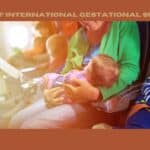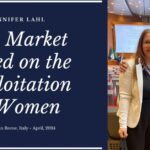On Common Ground (part one of a two part interview)
Jennifer Lahl is National Director of the Center for Bioethics and Culture Network. M.L. Tina Stevens, Ph.D., is author Bioethics in America, and teaches in the History Department at San Francisco State University. Diane Beeson, Ph.D, is a medical sociologist and professor emerita in the Department of Sociology and Social Services at California State University, East Bay.
Lahl: People often wonder how it is that pro-choice and pro-life feminists have come together in this great human cloning debate. That conservatives on the right and progressives on the left have found common ground and been able to work together seems miraculous! How and why do you think this has happened?
Stevens: The Right seems to have come to the cloning debate over a concern for the sanctity of the embryo. For the progressive Left concerns rested more immediately on women’s health issues regarding egg extraction. There are, however, more areas of overlap. Both are concerned, for example, with inheritable genetic modification and “techno-eugenics”. Many on all points of the pro-life — pro-choice spectrum are concerned by biotech conflicts of interest, starting with the motivational distortions caused by patenting. This can lead to grotesque situations. A dramatic example is the case of Jesse Gelsinger. Additionally, both the Right and the Left, I think, are concerned with biotech’s propensity to commodify human biology – looking at human biology for how it can be broken into components and capitalized upon. You don’t have to come from a religious tradition to feel that a profit motive should not be the driving force behind biomedical development and that when it is the driving force fairness, justice, and equality eventually will be compromised.
Beeson: Those of us who have come together seem to have done so because we understand that as important as the question of abortion is—and for me the right of women to control our own bodies is a very important prerequisite for a just and compassionate society—we see big biotech is taking us in a direction that has even more profound implications for the future of our species and for our humanity.
I have worked for social justice in many arenas in my life. I have opposed war and racism and in those struggles all my allies were not necessarily pro-choice. Whenever and wherever people can find common ground I think they should take advantage of it.
Perhaps the biggest factor in making me appreciate pro-life people has been their attitude toward disability and their rejection of eugenics. Throughout my career as a medical sociologist (over thirty years) I have studied families undergoing prenatal diagnosis and other forms of genetic testing. I have admired the way many pro-life families stuck to their principles even when the fetus was found to be severely disabled. When I was younger I believed the confident predictions of the geneticists that selective abortion was merely a temporary solution; within a few years we would have cures for all these conditions and we would not be practicing prenatal eugenics. The fact is the cures haven’t come, but the eugenic functions of reproductive genetics have expanded. For example, I learned years ago that we could eliminate most neural tube defects by addressing folic acid (a B vitamin) deficiencies in women. We chose instead to put our resources into massive prenatal screening programs throughout the country. I also learned from parents of disabled children that the meaning of any condition is not in the genetics, biology or physiology of it, but in how families respond to it.
I have watched prenatal diagnosis become the primary tool for preventing the birth of human females throughout the world. The latest estimates are that more than 10 million female fetuses have been aborted in India alone over the past two decades. This shows how reproductive technologies tend to be used to reinforce existing power arrangements.
While we are all being dazzled with the promises of high tech medicine many people’s health is declining because we aren’t taking care of the basics. We are offering more and more expensive interventions to fewer and fewer people. This feeds inequality and undermines democracy.
Unless our consciousness is dramatically altered and we get our priorities straight it is clear to me that we are moving toward encoding into our biology through inheritable genetic modification all the social inequality that the world has worked so hard to reduce. With such high stakes I think those of us concerned about this misapplications of science need all the allies we can muster.
Lahl: Are you optimistic that this is evidence that there is more common ground on other issues and we may be headed for less bipartisanship and a redefinition of boundaries? I mean, after all, everyone has a stake in ethical advances in science and biomedical technologies.
Beeson: I hope so. The real challenge is to find some common ground on the abortion issue, which on the face of it seems impossible. This is where the stakes seem very high. I would hate for us to lose the battle for the future biological integrity of our species, or even have clonal fetuses developed to near term in artificial wombs only to have their organs harvested because the antagonism between pro-choicers and pro-lifers made dialogue on these issues impossible. But this is where we are headed. I believe that Canadians are taking a more critical stance on human embryo cloning because women there are more secure in their abortion rights.
Author Profile

- Jennifer Lahl, MA, BSN, RN, is founder and president of The Center for Bioethics and Culture Network. Lahl couples her 25 years of experience as a pediatric critical care nurse, a hospital administrator, and a senior-level nursing manager with a deep passion to speak for those who have no voice. Lahl’s writings have appeared in various publications including Cambridge University Press, the San Francisco Chronicle, the Dallas Morning News, and the American Journal of Bioethics. As a field expert, she is routinely interviewed on radio and television including ABC, CBS, PBS, and NPR. She is also called upon to speak alongside lawmakers and members of the scientific community, even being invited to speak to members of the European Parliament in Brussels to address issues of egg trafficking; she has three times addressed the United Nations during the Commission on the Status of Women on egg and womb trafficking.
Latest entries
 infertilityApril 23, 2024The Rise of International Gestational Surrogacy in the U.S.
infertilityApril 23, 2024The Rise of International Gestational Surrogacy in the U.S. Assisted Reproductive TechnologyApril 16, 2024Founder Jennifer Lahl’s Speech on Surrogacy to the Casablanca Declaration
Assisted Reproductive TechnologyApril 16, 2024Founder Jennifer Lahl’s Speech on Surrogacy to the Casablanca Declaration #BigFertilityFebruary 27, 2024No, Alabama Didn’t Ban IVF
#BigFertilityFebruary 27, 2024No, Alabama Didn’t Ban IVF ArticleSeptember 25, 2023The Little Engine That Could
ArticleSeptember 25, 2023The Little Engine That Could

